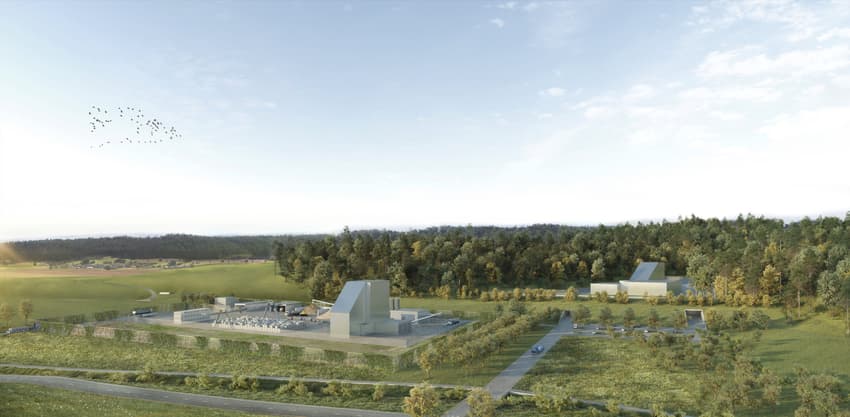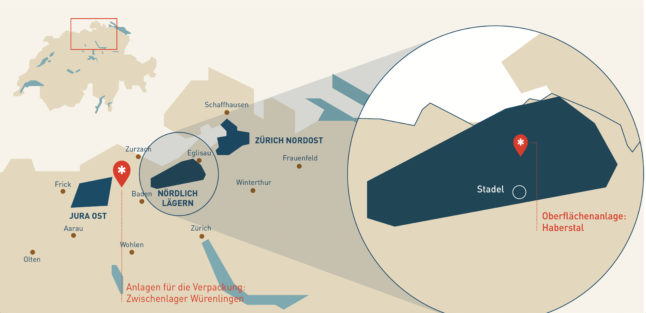MAP: Where has Switzerland chosen as the site for nuclear waste?

Switzerland announced the place where it intends to dump radioactive waste for centuries to come. Here's where it is and why it's so controversial.
Swiss authorities have selected a site in northern Switzerland, not far from the German border, to host a deep geological storage repository for radioactive waste, they said Saturday.
The announcement immediately drew criticism and Germany's Chancellor Olaf Scholz said he would "seek talks" with the neighbouring country as a facility so close to the border would "heavily burden" communities on the other side.
The organisation in charge of handling the country's radioactive waste said it had decided that the Nördlich Lägern area was the best of three sites it had been considering for the underground storage facility.
READ ALSO: Site in northern Switzerland picked for nuclear waste storage
We "chose Nordlich Lagern as the safest site for a deep geological repository," Felix Glauser, a spokesman for the National Cooperative for the Disposal of Radioactive Waste (Nagra), told AFP.
“Extensive investigations have shown that Nordlich Lagern is the most suitable site and has the largest safety reserves,” he added.

A map shows the site chosen for nuclear waste in Switzerland. (Photo: National Cooperative for the Disposal of Radioactive Waste (Nagra))
Where is the location?
The site in Nördlich Lägern is located in the Zürcher Unterland (lowlands in the northern section of Canton Zürich) in Northern Switzerland, according to the Swiss government.
It comprises twelve municipalities in the canton of Zurich and three in the canton of Aargau, with a population of around 52,000 and over 123 square kilometres.
The deep geological repository's underground and surface infrastructure facilities will one day be located on their territory.
The siting region also includes more than 30 other municipalities, including those in the neighbouring cantons of Aargau and Schaffhausen and Germany, which are indirectly affected by a possible deep geological repository.
Why is it the best place?
According to the National Cooperative for the Disposal of Radioactive Waste (Nagra), the most important natural barriers to containing radioactive waste are "stable and dense rock layers". These should prevent radioactivity from escaping.
"In Nördlich Lägern, the Opalinus Clay is a rock that is practically impermeable to water and seals itself when it comes into contact with water.", the authorities explained.
The Nagra found this geological barrier to be the best of all sites it had explored to contain radioactive waste. It also found that the region has the highest "long-term stability of the geological barrier", as the clay lies at a depth of between 800 and 900 metres.
READ ALSO: Germany seeks Swiss nuclear waste talks after storage decision
The authorities said: "Extensive investigations have shown that, in Nördlich Lägern, the quality of the rock is highest and it best confines the radioactive waste – not only today but also in the distant future."
"While the landscape at the earth’s surface will evolve, the repository deep underground in Nördlich Lägern will be protected as the rock is most stable there."
Why is it controversial?
Almost anything dealing with energy and, in particular, nuclear power will end up being controversial in Europe, especially as the continent faces an energy crisis and focuses on transitioning to cleaner energy sources.
However, the fact that the site is near the German border has made it even more controversial, as Germany has been intent on transitioning away from nuclear power for years.
While the nuclear storage facility would be "a few kilometres" away from the border, certain "surface buildings" would only sit two kilometres from German territory, a spokesperson for the German environment ministry said.
READ ALSO: Swiss government confirms ‘sharp increase’ in electricity prices
Germany would have to discuss the decision "through the usual channels with all those responsible in the Swiss government", Chancellor Olaf Scholz said at a press conference in Berlin on Monday.
Like Germany, the Swiss resolved to exit gradually from nuclear energy following the 2011 Fukushima disaster in Japan.
A final decision is not due until 2029.
Comments
See Also
Swiss authorities have selected a site in northern Switzerland, not far from the German border, to host a deep geological storage repository for radioactive waste, they said Saturday.
The announcement immediately drew criticism and Germany's Chancellor Olaf Scholz said he would "seek talks" with the neighbouring country as a facility so close to the border would "heavily burden" communities on the other side.
The organisation in charge of handling the country's radioactive waste said it had decided that the Nördlich Lägern area was the best of three sites it had been considering for the underground storage facility.
READ ALSO: Site in northern Switzerland picked for nuclear waste storage
We "chose Nordlich Lagern as the safest site for a deep geological repository," Felix Glauser, a spokesman for the National Cooperative for the Disposal of Radioactive Waste (Nagra), told AFP.
“Extensive investigations have shown that Nordlich Lagern is the most suitable site and has the largest safety reserves,” he added.

Where is the location?
The site in Nördlich Lägern is located in the Zürcher Unterland (lowlands in the northern section of Canton Zürich) in Northern Switzerland, according to the Swiss government.
It comprises twelve municipalities in the canton of Zurich and three in the canton of Aargau, with a population of around 52,000 and over 123 square kilometres.
The deep geological repository's underground and surface infrastructure facilities will one day be located on their territory.
The siting region also includes more than 30 other municipalities, including those in the neighbouring cantons of Aargau and Schaffhausen and Germany, which are indirectly affected by a possible deep geological repository.
Why is it the best place?
According to the National Cooperative for the Disposal of Radioactive Waste (Nagra), the most important natural barriers to containing radioactive waste are "stable and dense rock layers". These should prevent radioactivity from escaping.
"In Nördlich Lägern, the Opalinus Clay is a rock that is practically impermeable to water and seals itself when it comes into contact with water.", the authorities explained.
The Nagra found this geological barrier to be the best of all sites it had explored to contain radioactive waste. It also found that the region has the highest "long-term stability of the geological barrier", as the clay lies at a depth of between 800 and 900 metres.
READ ALSO: Germany seeks Swiss nuclear waste talks after storage decision
The authorities said: "Extensive investigations have shown that, in Nördlich Lägern, the quality of the rock is highest and it best confines the radioactive waste – not only today but also in the distant future."
"While the landscape at the earth’s surface will evolve, the repository deep underground in Nördlich Lägern will be protected as the rock is most stable there."
Why is it controversial?
Almost anything dealing with energy and, in particular, nuclear power will end up being controversial in Europe, especially as the continent faces an energy crisis and focuses on transitioning to cleaner energy sources.
However, the fact that the site is near the German border has made it even more controversial, as Germany has been intent on transitioning away from nuclear power for years.
While the nuclear storage facility would be "a few kilometres" away from the border, certain "surface buildings" would only sit two kilometres from German territory, a spokesperson for the German environment ministry said.
READ ALSO: Swiss government confirms ‘sharp increase’ in electricity prices
Germany would have to discuss the decision "through the usual channels with all those responsible in the Swiss government", Chancellor Olaf Scholz said at a press conference in Berlin on Monday.
Like Germany, the Swiss resolved to exit gradually from nuclear energy following the 2011 Fukushima disaster in Japan.
A final decision is not due until 2029.
Join the conversation in our comments section below. Share your own views and experience and if you have a question or suggestion for our journalists then email us at [email protected].
Please keep comments civil, constructive and on topic – and make sure to read our terms of use before getting involved.
Please log in here to leave a comment.